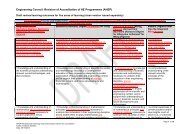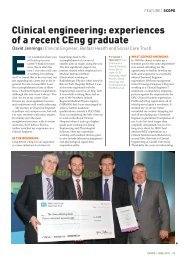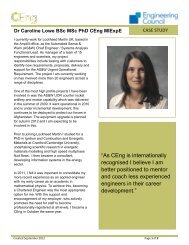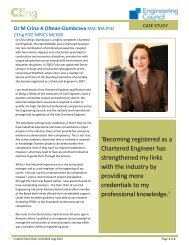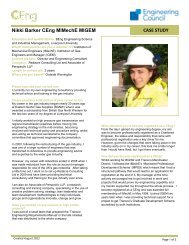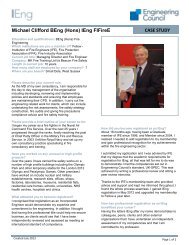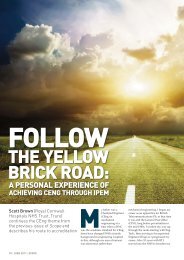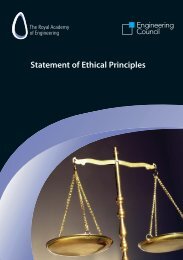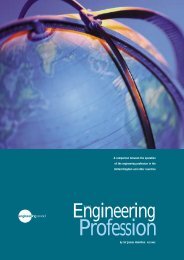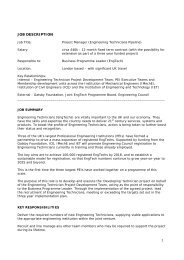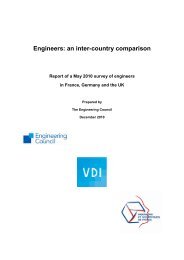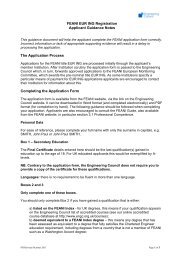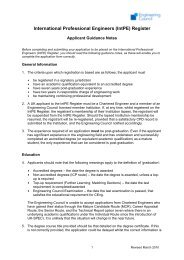An Engine for Change - A Chronicle of the Engineering Council
An Engine for Change - A Chronicle of the Engineering Council
An Engine for Change - A Chronicle of the Engineering Council
You also want an ePaper? Increase the reach of your titles
YUMPU automatically turns print PDFs into web optimized ePapers that Google loves.
42A CHRONICLE OF THE ENGINEERING COUNCILattendees consisted <strong>of</strong> four Chartered and two Technician <strong>Engine</strong>ers elected by each <strong>of</strong> <strong>the</strong>nineteen regions. A four-page Special Report on <strong>the</strong> Assembly had been published by TheTimes on <strong>the</strong> previous morning. In an advertisement contained within that report <strong>the</strong> EngCpointed out that “The <strong>Engine</strong>ering <strong>Council</strong> was set up to promote <strong>the</strong> cause <strong>of</strong> engineering inBritain”, its slogan being “Fighting to help Britain make it”. In her remarks, <strong>the</strong> PrimeMinister concluded: “It is <strong>for</strong> Government to create <strong>the</strong> right background conditions, but it isyou <strong>Engine</strong>ers who can grasp <strong>the</strong> opportunities and make our future prosper and I’m heretoday <strong>for</strong> one reason: to show <strong>the</strong> importance this Government attaches to your work, yourpr<strong>of</strong>ession and your role in our future. Our country’s success needs you!” The full text <strong>of</strong> MrsThatcher’s speech to <strong>the</strong> Assembly was published by <strong>the</strong> EngC in October 1985 as “ThePrime Minister Talks to <strong>Engine</strong>ers – <strong>Engine</strong>ering Assembly 1985”.The second annual <strong>Engine</strong>ering Assembly was held in July 1986 at University College,Swansea; on this occasion <strong>the</strong> guest <strong>of</strong> honour was <strong>the</strong> Secretary <strong>of</strong> State <strong>for</strong> Wales, The RtHon Nicholas Edwards, QC, MP. In Sir Francis Tombs’s own words in <strong>the</strong> EngC’s <strong>An</strong>nualreport <strong>for</strong> 1986, <strong>the</strong> Assembly was “now developing into a useful consultative body”. It wasreported that some ‘Young <strong>Engine</strong>er’ observers from <strong>the</strong> regions made significantcontributions to <strong>the</strong> Assembly discussions and it was decided that <strong>the</strong> involvement <strong>of</strong>engineers <strong>of</strong> this generation at Assembly meetings should be repeated.At <strong>the</strong> third <strong>Engine</strong>ering Assembly, held in July 1987 at Heriot-Watt University, Edinburgh,<strong>the</strong> guest <strong>of</strong> honour was Lord Sanderson <strong>of</strong> Bowden, Minister <strong>of</strong> State at <strong>the</strong> Scottish Office.It became evident that <strong>the</strong> annual Assembly was a most effective <strong>for</strong>um through which <strong>the</strong>pr<strong>of</strong>ession as a whole could voice its opinion on EngC policies. It was felt that <strong>the</strong> higherstandard <strong>of</strong> debate at <strong>the</strong> 1987 Assembly was a direct result <strong>of</strong> <strong>the</strong> ECRO’s local activitiesleading to <strong>the</strong> greater understanding <strong>of</strong> <strong>the</strong> overall role <strong>of</strong> <strong>the</strong> EngC. Two young engineersfrom each region were again invited as observers. Matters debated this year included:• Technician <strong>Engine</strong>ers and <strong>Engine</strong>ering Technicians.• The coordination <strong>of</strong> presenting <strong>the</strong> engineering pr<strong>of</strong>ession to <strong>the</strong> young through amore effective <strong>Engine</strong>ering Careers Co-ordinating Organisation (ECCO). [At thistime ECCO members were largely acting independently with no unifying <strong>the</strong>me.]• Effective communication by <strong>the</strong> EngC to <strong>the</strong> public <strong>of</strong> a better image <strong>for</strong> pr<strong>of</strong>essionalengineers and engineering, and effective communication with Registrants.• The development <strong>of</strong> joint activities in <strong>the</strong> regions <strong>for</strong> <strong>the</strong> Industrial Affiliates and <strong>the</strong>ECROs.• Stimulation <strong>of</strong> <strong>the</strong> use <strong>of</strong> <strong>the</strong> three titles, CEng, TEng and TechEng, with particularreference to linking <strong>of</strong> job titles with responsibilities.• Representation <strong>of</strong> Registrants on <strong>the</strong> EngC’s <strong>Council</strong>.Interfacing with SchoolsWISEThe role <strong>of</strong> women and girls in engineering was pursued with some vigour during this periodthrough <strong>the</strong> WISE campaign begun in 1983, as we mentioned in Chapter 2. Girls, women andemployers were all targetted. A WISE conference, sponsored by IBM(UK) Ltd, was held inCambridge in December 1985 when <strong>the</strong> EngC’s report ‘Career Breaks <strong>for</strong> Women Charteredand Technician <strong>Engine</strong>ers’ was published at £5. Two associated surveys were also publishedduring this month at £5 each: ‘Attitudes <strong>of</strong> Employers’, a survey undertaken by <strong>the</strong>© <strong>Engine</strong>ering <strong>Council</strong> UK 2004



